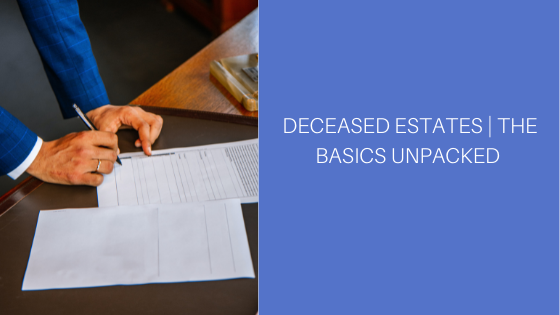It is never easy dealing with the death of a family member or loved one. Amidst the emotional turmoil, there are a handful of administrative tasks that also need to be completed, one of which is winding up the deceased estate. Below we’ll outline the basics of a deceased estate and how to start the process of winding it up.
What is a deceased estate?
When a person dies and leaves behind any assets, including property and money, a deceased estate comes into existence. The estate must be administered and distributed in terms of the deceased’s Will or the Intestate Succession Act. The estate will be distributed in terms of intestate succession if there is no will in place. This means it is divided amongst the surviving spouse, children, parents or siblings according to an order of preference.
What does the family need to do?
The requirements for the administration of a deceased estate are outlined in the provisions of the Administration of Estates Act, 66 of 1965. In terms of the Act, when a person passes away it must be reported to the Master of the High Court within 14 days of that person’s passing.
The Master appoints an Executor by issuing a Letter of Executorship or a Letter of Authority after the estate has been reported. The nominated executor will then set up an appointment with the family to complete the required documentation.
Who can be an executor of a deceased estate?
Winding up an estate requires knowledge in a variety of fields, such as tax, debt, life assurance and short-term insurance. It is possible to nominate someone like your spouse, an adult child, a family member or a friend as the Executor. Remember to you nominate someone you trust to take care of your family’s interests. And yes, your executor can still inherit from your estate!
Any one of these people can be nominated as an executor:
- Your spouse
- Another natural person
- An attorney or firm of attorneys
- An accountant or firm of accountants
- A bank
- A trust company
The person nominated will have to apply to the Master of the High Court to be granted the power to step into your shoes when you pass away,
What is the executor’s role?
Amongst other things, an executor will:
- Collect the deceased’s assets
- Settle his/her liabilities
- Pay any legacies
- Distribute the balance of the estate to the heirs in terms of the will of the deceased or in accordance with the provisions of the Intestate Succession Act where the deceased died without a will.
The administration of a deceased estate can be a lengthy and stressful process for the family of the deceased, which is why it is so important to have all your affairs in order. If you’d like to know more about deceased estates, or how to write your will, please feel free to contact us.

